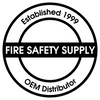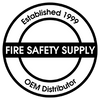Why Fire Safety Often Gets Overlooked Until a Tragic Incident Occurs
Posted by the FSS Team on Sep 27th 2024
Fire safety is a crucial aspect of any workplace, yet many companies often push it to the back burner until a catastrophic incident elsewhere serves as a stark reminder. This reactive approach to fire safety can have devastating consequences. So, why do companies sometimes fail to prioritize fire safety until a tragedy unfolds? Let’s explore some key reasons behind this mindset and why it’s critical to change it.
1. Perception of Low Risk
Many companies perceive fire hazards as low-risk compared to other immediate business concerns. Unless they’ve experienced a fire firsthand, the dangers can feel abstract. This false sense of security often leads to underestimating the importance of routine fire drills, equipment checks, and employee training.
2. Cost-Cutting Measures
Budget constraints often lead companies to prioritize spending on areas that directly impact revenue. Fire safety measures, such as regular inspections, maintenance of fire extinguishers, and installing fire suppression systems, are sometimes viewed as unnecessary expenses rather than vital investments. This “out of sight, out of mind” attitude often shifts when a fire incident hits close to home.
3. Compliance Over Safety Culture
For many businesses, fire safety becomes a checkbox exercise to meet regulatory compliance rather than a core component of their workplace culture. Instead of fostering a proactive safety environment, fire safety protocols are sometimes treated as a one-time task during inspections, with little ongoing emphasis until a shocking news headline spurs a reassessment.
4. Lack of Awareness and Training
Employees and even some managers may lack the proper training or awareness of fire safety measures. Without regular drills or education on fire risks, the entire workforce can be left unprepared. When a tragic fire happens elsewhere, companies suddenly recognize the gaps in their preparedness, often too late.
5. Complacency from Routine
Day-to-day operations often create a sense of routine and complacency, overshadowing the potential for emergencies. Fire safety protocols can be seen as interruptions to business flow rather than essential practices. This complacency is often shattered when a tragic incident elsewhere serves as a wake-up call.
6. Reactive, Not Proactive
Many companies operate in a reactive mode, only addressing issues when a problem becomes undeniable. After hearing about a tragic fire, businesses are jolted into realizing that the same could happen to them. This reactive approach delays the implementation of critical safety measures until the threat becomes tangible.
Turning Awareness into Action
Companies need to shift from a reactive to a proactive stance on fire safety. Waiting for a tragedy to spark action is a risk that businesses cannot afford. Regular training, investment in fire prevention equipment, and cultivating a culture of safety are not just compliance measures—they are essential steps to protect lives and assets.
At Fire Safety Supply, we’re here to help businesses of all sizes enhance their fire safety protocols. Don’t wait until it’s too late.
 Since 1999, Fire Safety Supply has been the go-to for fire suppression products, industrial dry chemical systems, high and low-pressure CO2, vehicles, and clean agents. We serve various types of industries such as restaurants, commercial kitchen, wineries, and more.
Since 1999, Fire Safety Supply has been the go-to for fire suppression products, industrial dry chemical systems, high and low-pressure CO2, vehicles, and clean agents. We serve various types of industries such as restaurants, commercial kitchen, wineries, and more.
